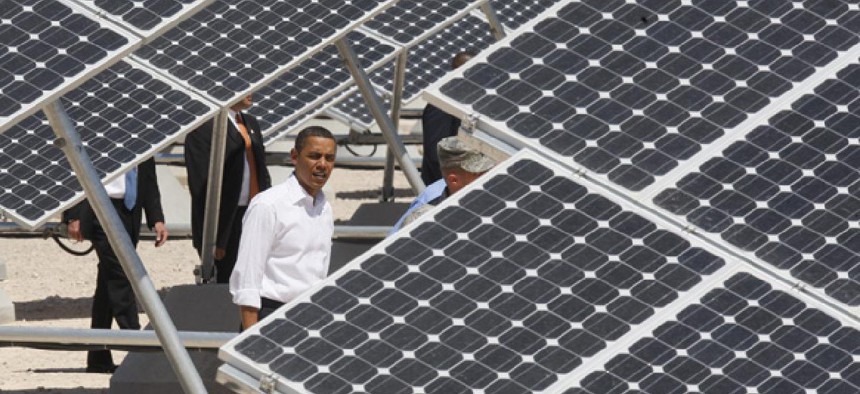How the Pentagon plans to wean itself off fossil fuels
Programs helpfully align with Obama’s unwavering support for clean energy on the campaign trail.
The Pentagon plans to roll out a new slate of clean- and renewable-energy initiatives on Wednesday as part of its long-term “Operational Energy Strategy” aimed at reducing the military’s dependence on fossil fuels while increasing its front-line fighting power.
The moves are in keeping with a sustained push by the military in recent years to cut its dependence on oil, which costs the Pentagon up to $20 billion annually and has led to the deaths of thousands of troops and contractors, killed while guarding fuel convoys in Iraq and Afghanistan.
Some renewable-energy projects at the Defense Department are already paying big dividends. Pentagon efforts to research and deploy products like hybrid batteries for tanks have enabled combat vehicles to travel farther without refueling, while advances in portable solar generation have allowed troops on the front lines in Afghanistan to power housing and electronic facilities without requiring fuel convoys to make dangerous drives through hostile territory to deliver the diesel required for traditional generators.
It doesn’t hurt that the initiatives also tie in politically with President Obama’s unwavering support for clean energy on the campaign trail -- even as Republicans continue to attack him almost daily on energy issues.
GOP and conservative “super PACs” have no problem hitting Obama for his support of renewable-energy programs in the wake of the bankruptcy of Solyndra, the solar panel company that cost the federal government $535 million in loan guarantees from the economic stimulus law.
But politically, it’s a lot harder for traditionally hawkish Republicans to criticize the Pentagon’s embrace of renewable power, which Defense officials have repeatedly made clear is not being done in the interest of an environmental agenda, but rather to increase security and fighting capability on the front lines.
Defense officials have also emphasized that much of the funding for the Pentagon’s renewable-energy initiatives won’t come from taxpayer dollars. On Tuesday, a Defense official said that the construction of renewable-electricity plants for Army and Air Force bases -- which the official said could cost up to $7 billion -- will be privately financed.
Projects being announced on Wednesday are:
- In Detroit, the Army will open a 30,000-square-foot lab to develop new technologies for fuel-efficient combat vehicles.
- The Army and Air Force will announce contracts to purchase one gigawatt each of renewable electricity from wind, solar, and geothermal sources to power domestic bases (one gigawatt is about the equivalent of one nuclear power plant’s worth of energy). That comes on top of a similar announcement last year by the Navy.
- The Energy Department’s Advanced Research Projects Agency-Energy lab will launch a $30 million research competition to build energy-storage devices that can be used in the battlefield, and ultimately should be available for commercial use.
While Pentagon officials haven’t tried to politicize their renewable-energy portfolio, the White House and Democratic candidates aren’t shying away from publicizing Defense Department moves that highlight their broader energy agenda.
On Tuesday evening, White House and Pentagon officials held a telephone press briefing on Wednesday’s clean-energy announcements in an evident effort to raise their profile. In a non-election year, it’s doubtful that announcements about how military bases will generate electricity would merit a White House background call—or whether a slate of such programs would even be rolled out together publicly.
In Michigan, Democratic Sens. Carl Levin and Debbie Stabenow are scheduled to be present at the opening of the advanced combat-vehicle lab. Stabenow could face a tough reelection fight this fall.
As it happens, the conservative super-PAC American Crossroads is also rolling out on Wednesday a $1.7 million television ad campaign attacking Obama’s energy policies in six 2012 battleground states: Colorado, Florida, Iowa, Nevada, Ohio, and Virginia.



